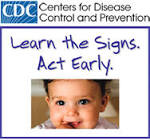Act Early Update
December 18, 2014

|
Thirty-one esteemed Act Early Ambassadors who serve as state liaisons to the "Learn the Signs. Act Early." (LTSAE) project have implemented several innovative and effective strategies to reach target audiences and improve early identification of Autism Spectrum Disorder and developmental delays. In six months, the Ambassadors have reached approximately 36,983 total target audience members. These target audience members include 18,873 parents of young children, 12,001 audience members through media outlets, 3,628 early care and education providers, 1,404 health care professionals, 846 family service providers, and 231 Act Early State Team members. A total of 39,984 LTSAE materials have been distributed to the target audience members. Ambassadors have distributed Milestone Moments booklets, brochures, and checklists, and Amazing Me: It's Busy Being 3! Materials, and integrated the Watch Me! online modules while delivering key LTSAE messaging to practitioners at UCEDDs, LENDs, health departments, home visiting programs, WIC, and public libraries.
In addition to delivering LTSAE key messaging to and collaborating with home visiting programs, public libraries, and museums, several Ambassadors are using media outlets to disseminate customized materials to primary and secondary target audiences. The Rhode Island Ambassador, Stacey Aguiar, is implementing a communication plan with the Communication Department at the Rhode Island Department of Health. The communication plan includes incorporating LTSAE web links onto www.health.ri.gov, showcasing LTSAE materials, web links, and videos on social media platforms, and having the DOH Director promote LTSAE messages on monthly Poder (Spanish language) radio appearances.
The 2013 Act Early State Systems Grantees aimed to improve their state and local systems for early identification and early intervention services for children with signs of Autism Spectrum Disorder and developmental delays. The State Systems Grantees projects involved public awareness, education and training, and collaboration activities to improve early identification. The grantees have shared the most significant lessons that they learned throughout their program implementation. Several of the grantees discovered that many home visitor programs were not aware of the CDC Learn the Signs. Act Early. initiative. Grantees who worked with home visitor programs found that it is essential to emphasize the process of early identification including developing observation, then screening, and then referral and family support. The California Act Early State Systems Grantee project revealed that home visitors believed that they could positively impact a child's life course through observations using the LTSAE materials as a starting point. The grantees also found that they need to identify partners to distribute materials to, and partners who will continue to use the materials after the project has ended.
If you would like to receive the Act Early Network e-newsletter, please email your name and email address to Abigail Alberico at [email protected], and she will add you to the Act Early listserv.







